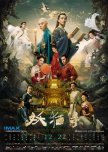
Are there limits to an emperor's power or simply limits to an emperor's love?
A black cat slithers sinisterly through the households of Changán's elite seeking out its favorite meal of fish eyeballs; a series of eerie inexplicable events in its wake. When it dares torment Emperor Xuanzong, palace official and aspiring poet Bai Letian (Bai Juyi) and visiting Japanese monk Kukai pair up to track down and exorcise the demon cat. These two historical figures must uncover the cause of the cat's resentment in this wildly speculative account of the inspiration behind the most renown Tang poem in history 長恨歌/Chang Hen Ge/The Song of Everlasting Regret or Sorrow.Yang Yuhuan (Yang Guifei or Precious Consort Yang) is a cultural legend that stirred the imaginations of artists, poets and writers for centuries. One of the Four Beauties of Ancient China, she was the femme fatale that distracted a great Tang emperor from affairs of state and sent the empire into decline. In this opulent blockbuster, Chen Kaige conjures the fantastical sensuous decadence of the Tang empire at its zenith and the subtle decay of its decline. While Sandrine Pinna hardly leaps to mind,, she passes muster as this famous, captivating beauty that toppled an empire. I cannot rave enough about how masterfully this production evokes the famous poem, with its vivid, erotic imagery of an incomparable beauty, an intoxicating and toxic love story and the haunting intensity of eternal regret and sorrow. Are there limits to an emperor's power or simply limits to an emperor's love?
Where the movie falters is in the narration. Both the role of Bai Letian and that of Kukai are miscast and not well written. The movie dwells too much on Kukai's backstory, which is not interesting and peripheral to the plot. There is zero chemistry between Huang Xuan and Sometani Shota and neither actor conveys why their character is compelled to solve the mystery of this enigmatic and very spooky cat. In fact it is Liu Haoran and to a lesser extent Ou Hao's White Crane and Red Crane that resonate and absolutely steal the show. Liu Haoran's portrayal of youthful infatuation, betrayal, the terrible burden of holding a lasting grudge and the release of letting go leaves the strongest impression among all the performances. If the two lead roles were better written and articulated, I would easily rate this better than 9,0 instead of 8.5. Nonetheless this is one of the best ancient fantasy thriller mysteries I have watched in a long time.
Was this review helpful to you?

Rules are made to be broken.
The bold and unconventional baroness Ban Hua is a one of a kind character. Her doting uncle is the emperor of Daye; her father the hedonist Marquis Jingting has more money than God; she inherited her grandfather General Ban's martial arts prowess and she has a wardrobe to die for. For her, rules are made to broken and her flamboyant devil-may-care attitude and daring exploits have the noblemen smitten and dazzled and the noblewomen choking with envy. If there is one stain on her charmed existence, it is that all her engagements go down in flames, to the amusement of the Daye elite.When the incomparable Ban Hua's path crosses with that of the elegant Rong Xia, Count Chengán, Daye's most talented and most eligible gentleman, their courtship becomes the talk of the town. The best thing about this drama is Ban Hua and Rong Xia's character design and their hilarious and sizzling interactions that light up the screen. The comedy is very well written and blithely presented by the lively cast. The Ban family is one of the most uproarious and delightful drama families I have seen in a long time. Ban Hua's biggest fan, her charming, spendthrift rogue of a younger brother Ban Heng is my favorite character. Both Guan Xiaotong and Hou Minghao hit all the right notes in their performances. Guan Xiaotong delivers a curious air of exquisite vulnerability that softens Ban Hua's imperiousness and arrogance. While Hou Minghao's Rong Xia is looks too handsome and unattainable and is so measured and powerful in a soft spoken way that he is the perfect foil for Ban Hua's impetuousness.
Unfortunately the plot does not at all do justice to the all-around strong performances by the cast. The history between Daye's aristocrat families and secret plotting that led to the Rong family's downfall is quite interesting and well conceived. I enjoyed watching Ban Hua and Rong Xia learn to trust each other and work together against their enemies. The drama would have been best served wrapping up after the take down of the villain of that early arc. After that, the plot feels very forced and succumbs to tropey, boring and contrived delusional love rival tropes. All of the progress the couple makes is undone to create unnecessary misunderstandings and ridiculous and unimaginative palace coups. I was left with the impression that the couple can't communicate or work together and is surely doomed to divorce. The second half is as boring and ridiculous as the first half is interesting and engaging. Rong Xia's character in particular is destroyed as he goes to inexcusable lengths to save his love. The character interactions are funny throughout and that is the only thing that kept me watching until the end. It is still overall a decent watch but nothing to write home about. This is overall a 7.5/10 but the first half feels closer to an 8.5.
Was this review helpful to you?
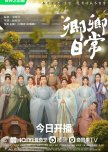
Behind every great man is a woman rolling her eyes.
New Life Begins is a fun and funny satire that mocks ancient Chinese feudal society. It is set in the fictional kingdom of Xinchuan, which presides over eight other provinces or chuans. Xinchuan is the poster child for every deplorable aspect of the feudal patriarchal society that prevailed over most of China's 5000 years of recorded history. Every three years as tribute, eligible young beauties from the provinces are sent for selection as wives or concubines of the Xinchuan princes. As these poor unsuspecting scions pore gleefully over bride portraits, little do they know that the very foundation of their kingdom and beliefs are about to be rocked to its chauvanist core.As fate would decree, subversive elements infiltrate that year's bride candidates. These elements are woefully untaught and unteachable in the Rules of Reverent Submission for Women. The kind of marriage envisioned by the Xinchaun royalty could not be further from their minds. The ringleader is Li Wei, a deceptively harmless foodie from Jichuan, an inconsequential province where men and women are equal and monogamous. She finds kindred souls in the scheming Hao Jia, the fierce Shangguan Jing and the savvy and ambitious Yuan Ying. Together, they prevail against the suffocating, often life threatening strictures of the Xinchuan inner palace to carve out an existence with some free will. Their brave and hilarious exploits resonate with the oppressed and fuels a fire across the inner palace and then, the capital. As it turns out, behind every great man in Xinchuan is a woman rolling her eyes. Despite the period setting, the ideals in this drama are very modern. It is a very fantastical utopian depiction of the kind of power women can unleash by simply working together instead of turning on one another.
This is not to say that all ten of the Xinchuan princes are bad fellows even though most of them make exceedingly bad husbands. With some, it is simply a matter of training while others need to be kicked to the furthest corners of the empire. The commercially savvy playboy Prince An who thinks he is the sun that the solar system revolves around when he is really the moon is the caricature that made me laugh hardest. That said, the entire ensemble cast delivers rib-tickling and lively comedic sketches that poke fun at the mundane. In a mostly lighthearted and positive but rather cursory manner, the drama evokes many women's themes. Hua Jia's arc is the darkest and most complex one and sounds a dire warning about disgruntled female employees. The sub-plots are short and even though the villains made my blood boil, they are not that smart or complex. That is because the true villain is the tyranny of the patriarchal feudal system and they are all victims of its shortcomings.
All of the sub-plots unfold around the evolution of the relationship between Li Wei and Yin Zheng, the unfavored sixth prince. Hilarity ensues when this woman who lives to eat finds herself shackled to a man who eats to live! With the help of MVP Butler Su, she attempts to tease out the inner fat dude just waiting to burst out of Yin Zheng. In fact, food is her secret weapon; she worms her way into practically everyone's hearts through their stomachs. Both Bai Jingting and Tian Xiwei have good comedic expression and they are fantastic at seamlessly turning funny moments into heart stopping passionate ones. While theirs is a fun, wholesome story, it is too much of a fairy tale. Neither of them have serious flaws and every cloud has a silver lining. In fact Li Wei's perpetual chirpiness grated on me at times. While Yuan Ying is a fabulous and formidable character and I get that one woman's treasure is another's trash, that entire situation is just too good to be true. I also didn't like how their relationship jumps from courtship to the comfortable rhythm of a long married couple, deferring the best romance part till the end. It breaks the natural momentum of a relationship and distracts audience attention from the other arcs. In truth, this drama is a lot more about sisterhood and women's themes than it is about romance. The production should be more confident that these well written, funny, and touching arcs can engage on their own without dragging out the romance to keep viewers invested.
This is one of the rare times that it is the second couple, Shangguan and Yin Qi that stole my heart. I have a weakness for flawed, colorful and unconventional characters like these. Yin Qi's plight is far worst than Yin Zheng's - he is just as unloved and he is no great talent to boot. In the bride lottery, he finds himself sacrificed to the fierce Shangguan, a princess from the powerful and matrilocal Danchuan. But he has a giant heart to go with his big goofy happy-go-lucky smile that makes the fiery Shangguan forgive him for always saying wrong things. Their clashes and banter made my shoulders quiver with laughter as they humorously navigate true challenges and hardships together. Even though they are not perfect and don't have everything, I somehow get the feeling they couldn't be happier.
Overall this is a gorgeous, lighthearted and highly enjoyable story about women's struggles and sisterhood with some romance thrown in. It lacks depth, is slow in places and is far from a masterpiece but the humour is very well done and has mass appeal. A highly recommended watch that I rate 8.5/10.0.
Was this review helpful to you?

A wrinkle in time.
This is a surprisingly enjoyable short love story with a novel premise. He Zhengyu, a hot shot lawyer experiences a series of setbacks that lands him in a modest apartment. Every night, he is "haunted" by rookie reporter Chen Jialan, who occupied the apartment four months ago. A wrinkle in time brings them together each night at 10:06pm for 46 minutes. During this time they must solve a few cases that they were involved in professionally that may have set them on the road to perdition.The initial encounters between Zhengyu and Jialan are hilarious and intriguing as they both scare the hell out of each other. They had me rooting for them from the get go. But as their relationship progresses, I find Jialan remains too sweet, childish and cutesy. I expect to see their chemistry take on a more mature and adult tone later on but this doesn't quite happen. Nonetheless, I stayed invested in their story throughout and kept going even though the whole Jirong saga bored me to tears. I have not seen such bland and monotonous acting in a long time. It is almost criminal to pair up such an insipid actress with such a hot actor as Dai Gaozheng. The cast overall is not strong and it is Yang Xuwen's convincing and charismatic portrayal of Zhengyu and how he is changed by this wrinkle in time that elevates the main relationship and saves the entire drama.
The biggest plot hole in this story is He Zhengyu's lack of curiosity about who Chen Jialan was and why she vacated the apartment he moved into. You would think his first instinct would be to find out everything about her and to try to track her down. But no, he waits till very late in the game to do this. The cases are only mildly interesting and the villains are quite obvious. While the drama does a good job transitioning between the past and the present, the main characters traverse back and forth too often and too inconsequentially. The plot does become slightly convoluted towards the end, with too many twists. Despite some obvious flaws and plot holes, there are enough fresh and engaging moments that make this an entertaining watch. This is a 7.5/10.0 that will nicely tide over a dry spell.
Was this review helpful to you?
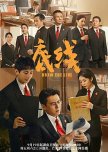
Justice is blind and not heartless.
I have never had a good impression of China's opaque legal system so I was both curious and skeptical about Draw the Line. This drama is a fascinating tour of the inner workings of China's grassroots level judicial system. It shines a surprisingly candid spotlight on gaps in the Chinese judicial system from rapid economic growth, modernisation, changing social values and the proliferation of the internet and social media.Fang Yuan is the presiding judge at the Xingcheng District Court, a local people's court of first instance which handles both civil and criminal cases. Fang Yuan's division handles civil cases while criminal matters are adjudicated by his colleague Song Yufei, a deputy chief judge of the intermediate people's court. What surprises me most is how hands on the grassroots judges are in the Chinese legal system. They do a lot of field work themselves from directing the gathering of evidence to personally interviewing plaintiffs, defendants and witnesses. The role of lawyers is so passive and marginalized it is as if they are for decorative purposes only. For civil cases, the court first seeks to resolve conflicts through court sponsored mediation. If an agreement, is reached, it becomes legally binding once it is reviewed and documented by a judge. Mediation can be a draining process, especially when dealing with less educated, unreasonable and belligerent citizens. Thus beyond legal knowledge it takes a combination of investigative and persuasive skills and a healthy dose of patience to be effective as a grassroots judge in China.
The arrival of Ye Xin, a young researcher from the Supreme Court is met with speculation and trepidation by the close knit community at the Xingcheng District Court. She is an annoying character in the beginning because she has no practical experience, and adopts a rigid by the book approach to interpreting the law. Experienced grassroots judges like Fang Yuan and his mentee Zhou Yian are more pragmatic about bridging the inevitable gaps between static legal codes and the myriad complexities of real life cases. Still it is never easy to figure out where to draw the line between the letter of the law and the spirit of the law. Beyond the heavy case load, the courts also face the challenge of social media, where cases are tried in the court of public opinion on distorted facts. Although the judges do their best to weigh the the practical, moral and humane aspects of their decisions, they don't always get it right. They have their own flaws, biases and personal or familial pressures. These dynamics set Chinese Supreme Court down the path of judicial reform, where case law is increasingly implemented instead of just statutory law.
The impeccably curated cases create a fascinating mosaic of moral, familial, commercial and social issues great and small confronting the Chinese public today. They are based on thought provoking and relevant real life cases; some of which have sparked public debate and controversy. The drama is very even handed about presenting both the plaintiff and defendant's point of view. The writers very effectively showcase resembling cases to illustrate the range of different human emotions, motives and outcomes. There are cases where two sons are driven to kill because of their mother, sexual harassment cases with different power dynamics and common reasons for the breakdown of marriages and related child custody disputes. From the mundane and petty to the serious and complex, the cases strike a riveting, sometimes heart rending chord because we have all read about or heard about or experienced something similar. At the same time, these cases deftly illustrate the many challenges faced by grassroots judges. They are the everyday heroes who navigate the grey areas of the law and morality with compassion to deliver justice that is blind and not heartless.
The cast in this drama needs no introduction and does a stellar job in drawing out the complex human aspects of the cases. Jin Dong delivers a multi-faceted Fang Yuan who is everything to everyone at work - a stern and impartial judge, a tireless and persuasive mediator, a wise mentor and a playful colleague. This leaves him with much less to give at home as a father and husband. We see a very down to earth version Cheng Yi as the introspective Zhou Yian, the young judge who must surely cut his own hair! He convincingly navigates a crisis of conviction after making some mis-steps. Both Yian and Cai Wenjing's Ye Xin are the characters who show the most growth in this drama but the characters that move me most are either defendants or plaintiffs in some of the more heart rending cases.
The best, most thought provoking case to me is the one about the roommates that is analogous to tripping a friend to escape a bear attack. Even though all the cases are interesting, there are too many of the cases in the back half that personally entangle various court personnel. This requires repeated suspension of disbelief in terms of how impartial and self sacrificing the various protagonists managed to be. It also highlights in my opinion an area that still needs judicial reform, which is how conflicts of interest are handled. It seems there is no requirement for judges to recuse themselves when their colleagues end up as defendants. The ending case is just too personal with too many coincidences and conflicts and an outcome that I find the least equitable with some defendants getting off too lightly while others are very harshly indicted. It is not the right note to end on and as a result I rate this an 8.0 instead of an 8.5. Overall a highly recommended, eye opening, thought provoking and fascinating watch with heart felt performances from some of my favourite Chinese actors.
Was this review helpful to you?
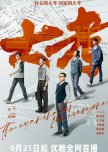
When it rains, it pours.
At first glance, this is a tribute drama with low audience appeal. The topic of gaokao 高考 or national college entrance exams is already stress inducing. Throw in the pandemic and the average viewer would head for the hills. I snuck a peek because I like to keep an eye on Rong Zishan's growth as an actor. To my surprise, I was hooked from the first episode of this uplifting story about the resilience of youth in the face of great challenges.This drama is not about China's urban elite. It is set in Jinhe County, where most of the households are among the two thirds of Chinese households that are not part of the middle class. The pandemic disproportionately affected high school seniors from this class of Chinese society. Gaokao is a life changing rite of passage for them. All the hopes and dreams of their families are staked on their gaokao performance. With less resources and uneven access to the internet, online learning is less effective for many of them. The pandemic exacerbated the economic and social pressures these families were already experiencing. This drama offers some insight into why the Chinese leadership has clung to an extreme zero tolerance covid policy so different from the rest of the world.
The narrative focuses on five students of Jinhe County No 1 Middle School (Pan Xianxuan and Gao Mingyu) and Jinhe County No 4 Middle School (Zhou Bowen, Wu Jiajun and Tian Wenwen) and their principals Wang Benzhong and Shi Aihua. Because it is a small county, there are about three degrees of separation between the students, teachers, their families and the broader community. Bowen, Wenwen and Jiajun are fast friends at No 4 Middle School, where Bowen is the star pupil. He intensely disapproves of his deadbeat dad Zhao Meiren, who is charismatically portrayed by Wang Xiao. Wenwen is left to fend for herself after her grandmother passes away as her absentee parents run a business in Wuhan. And aspiring artist Jiajun suffers from the nightmare oversight of the ultimate tiger mom. They are part of an online student chat group with Pan Xianxuan and Gao Mingyu, students at the No 1 Middle School, which is a boarding school. My favorite character, Pan Xianxuan is a savvy and commercial doer who is not academic oriented. Despite his father's wealth, his is practically homeless as both his divorced parents have long moved on. And finally Gao Mingyu, the most impoverished and driven of them all whose only family is an ailing grandfather. They form a fast friendship and benefit from the care and affection of their principal Wang Benzhong, who is more like a surrogate parent to them both.
Every time I watch a drama with young actors matched up with veterans like Chen Baoguo, Wang Quanyuan and Wang Xiao,I am floored by the seamless and natural the performances all around. I feel fear for the current generation of popular actors whose flaws only become more obvious when they act across veterans because the next generation is growing up fast and there are lots of them. This cast made me invested in their stories from the get go and sharked me into enthusiastically watching a flag waving, sappy, inspirational story, the kind that I have a very small yearly quota for. The message of the story is very clear - often in life, when it rains, it pours but it is in times of hardship that we find our best selves.
While this story does carry some powerful and moving coming of age messages beyond surviving a pandemic, what I didn't like is it is a bit too good to be true. The pandemic turns every flawed character into a better version of themselves. The strong sense of community and the dedication and fighting spirit of parents and teachers can prevail over an amorphous enemy and natural disasters alike. Most of all, the pandemic didn't seem as isolating and as disruptive as it probably was and the government's pandemic control measures are portrayed as very mild. To be fair, this is not set in a densely populated community and it is during the first 200 days of 2020, during which China had effectively contained the outbreak to Wuhan. Nonetheless,, I feel there is a bit too much sugar coating and white washing in this drama that avoids the uglier, more realistic aspects of the pandemic and China's response to it. It also loses focus at times as a result of trying to acknowledge too many every day heroes from educators to health workers.
For a flag waving drama, this is a surprisingly good watch and the propaganda aspects are non intrusive. The youth aspects are well written and wonderfully portrayed. I am happy to rate this a very solid 7.5.
Was this review helpful to you?

The Making of a Di-tective
Strange Tales of Tang Dynasty is 2022's surprise hit and a must watch for mystery wuxia buffs. Inspired by zhiguai xiaoshuo 志怪小说, this is a collection of slightly supernatural mysteries set in Tang dynasty. This form of folk literature was very popular during that period and is not limited to ghost stories but also strange or anomalous phenomena. Fifteen centuries later, these fantastical tales continues to set imaginations afire and is a well explored genre in contemporary media. Well before Tsui Hark's wildly entertaining and successful movies from 2010 onwards, Detective Dee was already by far the most ubiquitous protagonist of this genre.The Tang Code is one of Tang dynasty's great accomplishments and was the model for all future dynasty's legal codes in China and East Asia. Di Renjie was a Tang judge renown for numerous fair and impartial judgements and one of the heroes of ancient China. He twice ascended to rank of chancellor during Wu Tzetian's reign. The popularity of zhiguai xiaoshuo and this rich historical backdrop makes this period rich fodder for fantastical Di Renjie inspired ancient detective stories like this. This is set during Wu Tzetian's son Ruizong's second reign. Ruizong was a pretty useless emperor and his sister Princess Taiping was the real power behind the throne. Harboring ambitions to be another Wu Tzetian, Princess Taiping was engaged in a power struggle with crown prince Li Longji (Xuanzong). In terms of recent Tang dramas, this takes place after Luoyang and before Longest Day in Changan and The Imperial Coroner. This drama is well researched, largely respects history and is true to the societal, institutional and legal norms of the day.
The county sheriff of Chang'an, the capital city is found dead under spooky circumstances. Su Wuming, a disciple of the revered Di Renjie is summoned hastily to Changan to assume this position. His path keeps crossing with that of Lu Lingfeng, a proud and ambitious young general of the jinyiwei or imperial guards. Their relationship starts off as adversarial as Lu Lingfeng clearly resents that Di Renjie once rejected him as a disciple While not his match in rank, resources or martial arts, the crafty Su Wuming runs circles around Lu Lingfeng and manipulates him (and his resources) into aiding in his investigation. As they race to unravel their entangled cases they encounter sorcery, shape shifters and battle adversaries with unworldly powers. Inevitably a grudging mutual respect and comradeship forms between the men. While Su Wuming is clearly the master detective, Lu Lingfeng is also smart and has great instincts but is foiled by his quick rush to conclusion and lack of experience. This is not another cliched and static brains vs brawn investigative combo where the brains (Holmes, Poirot) is elevated by how dumb and naïve their sidekicks are (Watson, Hastings). This is just as much Lu Lingfeng's story as it is Su Wuming's. Under Su Wuming's discreet tutelage and hilarious machinations that fall barely short of hazing, we see the makings of a Di-tective out of Lu Lingfeng.
Lu Lingfeng''s overweening pride and arrogance would come off as off-putting if it were less charismatically portrayed by Yang Xuwen with the subtlest sense of self-awareness and irony. Although the Tang rulers made imperial exams a mandatory prerequisite, scions of noble families such as Lu Lingfeng's were able to secure coveted positions and advance on the fast track as a result of patronage. This explains why at such a young age he was a fourth rank general in the elite imperial guard. I think most don't appreciate how ignominious it is for Lu Lingfeng to accept a subordinate position to a county level official such as Su Wuming. He rolls with the punches and learns from his mistakes to discover a greater sense of accomplishment by earning his way back to the top. After a long hiatus, it is good to see Yang Xuwen come back with such a multi-faceted, well interpreted character that is arrogant and quick tempered on the outside but pragmatic and even mushy on the inside. He has amazing rapport with veteran actor Yang Zhigang who delivers a flawless depiction of the astute, seasoned detective with keen survival instincts and a slightly diabolical sense of humor.
While Su Wuming is the maestro that pulls all the threads together, the cases are tackled by a motley team of talented and engaging characters they pick up along the way. Master Fei Ji is the extraordinary doctor who sells his soul for a chicken a day, Pei Xijun is insightful beyond her invaluable photographic eye for detail while Xue Huan and Ying Tao round out the formidable martial arts team. They are all lost souls who become found family and find meaning in their work together. It is rare to see such excellent character development in this genre, which tends to be more plot heavy. The team dynamics and witty repartee is one of the most enjoyable aspects of this story. There are two romances that don't take center stage but are quite charming although the second one in particular is not necessary. This is a wonderful ensemble cast that put a lot of heart into their performances. While some of the acting lacks finesse, it is yards better than all the boring posing by overpaid and entitled idol actors that the industry keeps cramming down our throats. It is clear from the production values, the well choreographed action scenes and the CGI that the budget was spent on all the right things.
This intriguing and engaging collection of strange cases from the Tang dynasty hooked me from the start. In a year where too many high profile Chinese dramas have started strong only to fall down on plot, this drama delivers into the final mystery. There are eight cases that wander down an intriguing path of murder, mayhem and all kinds of odd happenings that pay homage to real records of such occurrences from that period. The cases are well written and littered with clues that will allow the attentive viewer to participate in the solution. The supernatural elements end up mostly but not entirely debunked, leaving a nice eerie aftertaste. To me the most frightening case is the one involving the scholar Dugu Xia (shout out to the most underrated actor Han Chengyu), where true evil is not some supernatural phenomenon but resides within man's nature. The drama finishes strongly with an excellent cold case, one that evaded Su Wuming's mentor Di Renjie. If I have one complaint, I would have liked to see the whole team crack the final case together. Instead they traded in two favorite characters for two that are introduce late in the game. I also didn't like that Su Wuming and Lu Lingfeng pursued separate leads for most of the final case although I understand that is to show Lu Lingfeng has come into his own.
I expected this low profile drama to be one of a long string of forgettable Detective Dee wanna-be dramas that is just good to pass some time. I am still rather befuddled at how enjoyable it is. It is on par with, if not slightly better than Ancient Detective, 2020's sleeper mystery wuxia hit, which I also rated 9.0. This has toppled many higher profile dramas to rank #2 on my watch list for 2022.
Was this review helpful to you?
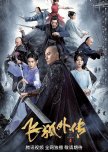
You can't bring a sword to a gun fight.
Like many wuxia fans, I consider Jin Yong / Gum Yoong (Cantonese) the greatest wuxia writer of all time. Side Story of Fox Volant 飛狐外傳 is one of his early works. It was written shortly after The Flying Fox of Snowy Mountain 雪山飞狐, which is both a prequel and a sequel. Unlike many versions that combine both novels, Side Story of Fox Volant is adapted as a stand-alone story. Despite some meaningful changes, this adaptation captures the essence of the original story, the spirit of martial heroes or daxia/大侠 and the vagaries of jianghu/江湖.The drama is action packed with fast paced, intense, starkly violent and brilliantly choreographed combat sequences that will satisfy any hard core wuxia buff. Slow motion is used sparingly for maximum brutal impact. No one has magic qigong or special powers. The main fighters - Hu Yidao, Miao Renfeng, Hu Fei and Tian Guinong are swordsman with distinct combat styles and battle advantages. When they clash it is very muscular and lethally up close. The nimble Yuan Ziyi's weapon of choice is a whip, which minimizes close encounters to compensate for the physical disadvantage of being a woman. With each episode I think the action has to be as good as it gets but to my surprise and delight, the production keeps delivering into the final wulin arc. The wulin arc in terms of both plot design and action is the best I have seen. While Miao Renfeng and Hu Fei's martial teamwork in episode 22 may be the best of the best, the ending battle encounters are inventive, exhilarating and savagely satisfying. The action scenes are this drama's strongest point and are worthy of multiple thrilling re-watches.
I am not a fan of the trend of whitewashing characters, especially Jin Yong's characters. Jin Yong is the master of multi-faceted characters. His heroes are flawed. His villains have redeeming features. Nobody is perfect in the Jin Yong universe. So when writers have the audacity to tweak his characters, they usually muck it up. When it comes to earlier, less refined works like this, I don't mind so much as there is room for improvement. While this version does a good job with Yuan Ziyi, Hu Fei is disappointingly adapted beyond recognition. The attempt to make Tian Guinong and Nan Lan empathetic is nauseating and boring. This is one of the four don'ts Jin Yong specifically warned against in the preface to the latest edition of the novel.
This is one of the author's darker, more cynical works. Most of the characters love too well but not wisely - Hu Fei, Miao Renfeng, Cheng Lingsu, Ma Chunhua, and Nan Lan. The heart wants what the heart wants, consequences be damned. Nan Lan and Ma Chunhua are selfish and don't care who they hurt in the process while Cheng Lingsu, Hu Fei and Miao Renfeng are noble idiots. They all pay a terrible price for following their hearts. Yuan Ziyi is the only exception; she dares only to hate but not to love.
Yuan Ziyi is one of Jin Yong's most under appreciated and saddest heroines. She is the only heroine who is not an extension of the hero; she is on her own independent path to salvation. Born from an act of violence, she is consumed by self loathing; doomed by unkind karma to seek justice and then live a life of atonement for the sins of her father. In the context of her beliefs, if she breaks her solemn oath she will only prolong her bad karma. In the novel, she acts out and does very controversial things. These actions drown out her piteous backstory and make her a widely disliked character. This adaptation deftly writes out those events, enabling us to see her in a more empathetic light. Her shifu should have been left offscreen as her pressure obscures Ziyi's own resolve to keep her vow. I always feel terribly sorry for Ziyi; she never had free will. She is alive but she does not live. I am not sure that chanting sutras into oblivion is a better fate than death, which is final liberation from all suffering. I don't love Liang Jie's acting but her Ziyi impressed me. The slightest shadow of regret in her eyes in a stone cold face and her ability to convey so much beyond her words moved me to tears several times.
Even though Cheng Lingsu is a clever character, I never found her relatable because her entire reason for existence is Hu Fei. But to my surprise, I like Xing Fei's warm and personable rendition of Lingsu. Her Lingsu is devoted to Hu Fei without coming across as a doormat and she gets him out of many tight spots with her quick thinking. The complex entanglement between the three of them is well portrayed. Hu Fei's chemistry with Ziyi is tangibly different from his dynamics with Lingsu, making it immediately obvious who he loves and who loves him. He is much more of one heart with Ziyi and they instinctively act in unison with little need for communication or explanation. Whereas Lingsu is constantly reining Hu Fei in and giving him instructions that are at odds with his natural instincts. When he can't help disobeying, he appears reckless and unintelligent. This character flaw arguably contributes to what happens to Lingsu at the end. There are better ways to show that Hu Fei is less in sync with Lingsu without throwing his character under the bus.
Lin Yushen's Miao Renfeng steals the show in this drama. Criticism that his Miao Renfeng is too much like his Yang Xiao in Heaven Sword is fair but he is so cool and he pulls off the character's inner conflicts and emotions so well that I don't mind. This performance anchors the drama for he is the martial hero of this story, His code of honor demands that he does the right thing even when it is the wrong thing for himself and those he loves. I wouldn't object if they call this the Legend of Miao Renfeng because of this compelling portrayal of what it means to be a daxia. Even though he is movingly handsome when he is suffering, the story wallows in Miao Renfeng's betrayal and loss for too long. The tawdry Nan Lan/Tian Guinong arc is a boring extended digression. The opportunity missed is that Hu Fei and Miao Renfeng do not get enough scenes together. They have remarkable combined chemistry and their joint fight scene is the one of the drama's best.
As for the titular character Hu Fei 胡斐, (which is a homonym for fox volant or flying fox), I always loved his character design. Far from being infallible, he is a work in progress - young and smart with tons of potential but a bit hot headed and too idealistic. He is the people's hero; the guy who demands justice for the underdog regardless of the cost to himself. His best traits, this strong sense of righteousneous and his willingness to fight the unfair fight is dumbed down to recklessness and even stupidity in this adaptation. He is written off as a bull in the China shop whose hot headedness could wreck the Red Flower Society's mission to save wulin. He doesn't accomplish much on his own and without Ziyi and Lingsu, he'd have died many times. It does not help that despite his phenomenal acting, Qin Junjie looks a bit too mature to play an 18 year old.
Despite good pacing, the plot digresses into too many dull sub-plots and arcs. This is an issue with the original work, which this adaptation already cleans up considerably. The Nan Lan and Poison Valley disciple arcs are the least interesting and Hu Fei deserves to be less peripheral in the reveal of the conspiracy behind Hu Yidao's death. The wulin arc brings the story to a climax, one that exceeds that of the novel on some fronts but is a let down in other aspects. Good characters die in wuxias, it is par for the course. But their deaths must be worthy and not gratuitous. What I dislike most about the ending is that it unnecessarily sacrifices a knight errant after they capture the king. It is a futile sacrifice because you can't bring a sword to a gun fight. Sadly, the advent of guns heralds the demise of jianghu and martial heroes.
This is a good adaptation overall that is limited by original works that lack the finesse of Jin Yong's subsequent masterpieces. The novel is already too dark and unbalanced. It is not necessary to outdo Jin Yong in how incredibly cruel he is to Hu Fei. Despite its darkness, the novel still ends on a note of optimism because Hu Fei's journey continues. But in the drama Hu Fei seems to be left to live largely in the past with two women, one too old and too icky for him and another so young it would be too icky. Thus to me this is at best an 8.0 in terms of storytelling that I bump up to an 8.5 for the not to be missed fight scenes. Nonetheless, this wuxia takes you on a stirring and addictive journey that is well worth it - as long as you do not need a Disney ending.
Was this review helpful to you?
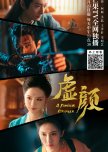
Face off.
While looking for her long lost sister, Shi Qi is overpowered by the scheming Prime Minister's daughter Shen Qin. When she wakes up, she discovers that a magician used dark magic to swap her face with that of Shen Qin. She finds herself married to General Xiao Hansheng in Shen Qin's place. Shen Qin assumes Shi Qi's identity and returns to the side of her lover the ambitious and ruthless Prince Ning. Shi Qi is unable to expose Shen Qin to either man as her sister is held hostage by Shen Qin. The plot tightly weaves together lurid affairs, murder and intrigue, treason and breathtaking, titillating romance. The suspenseful tension climaxes in a satisfying face off between the two women with a gobsmacking twist. Best to steer well clear of spoilers for this one.While the chemistry between the lead couple sizzles with passionate intensity, there is a quiet authenticity in how their relationship blossoms. The powerful hook of this romance is the simple convincingly articulated idea that Shi Qi has a unique identity that transcends her physical appearance and her true soulmate can sense her soul, the core of who she is. This is at sharp contrast with Prince Ning who lacks insight and does not have the same connection with his lover. That said, the second couple's dark chemistry is also alluring enough to make me root for them. While the story is quite dark, the dialogue is infused with wit and humour. The rapport and banter between the general and his much aggrieved military advisor hilariously and effectively captures the evolution of the general's feelings.
There is little to find fault with in the crisp, intriguing plot and the heartfelt performances by the young cast. Indeed these gorgeous young actors can give lessons to their more established peers on how kiss scenes should really be done and how not to sleepwalk through a drama. Is it a masterpiece? Nope but it is addictive enough for me to rate it an 8.0.
Bottom line - this is a total find of a delectably sexy and suspenseful romantic short-length drama that you must start watching now. Just do it. And thank @Noel for this stupendously good recommendation.
Was this review helpful to you?
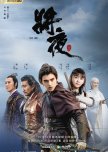
Beware of false prophets.
Ever Night is an epic fantasy adventure hit set in a mystical, ancient world where the balance of power between rival kingdoms is maintained with the aid of powerful warlords and cultivator sects. The vivid stunning palette is infused with an ominous sense of dark prophecy. The soothsayers warn that the child of darkness will bring an ice age or ever night and chaos to the world.The main protagonist Ning Que makes an thrilling debut as a lethal, almost ferally vicious warrior in a ferocious, spectacular desert ambush. This opening sets the tone for some of the most exhilarating and well choreographed fight scenes that Chinese drama has to offer. The drama is visually spectacular and delivers on the hype on many fronts, especially in terms of its movie quality production values. The sweeping breadth of the story can be overwhelming in the sheer number of characters representing different kingdoms and sects that makes the story appear more complicated than it really is. This is really the story of Ning Que (and by extension Sang Sang's) quest for revenge that sets him on an epic journey to become one of the strongest cultivators in Haotian.
Ning Que is an anti-hero. He is ruthless, cunning, manipulative and can be quite dishonourable. While at at times Chen Feiyu's acting could do with some polishing, he is superbly cast as Ning Que. He emanates that simmering resentment and burning thirst for vengeance that propels Ning Que to prevail against overwhelming odds and superior foes. With his lithe powerful build, his combat scenes are bloodthirsty and violent and his facial expressions are vicious, almost feral. Ning Que's arch-rival the glorious Prince Longqing is an interesting mirror character on a parallel path that makes different choices at important milestones along the way. What is quite remarkable about this story is there are no outright villains. The world they exist in is cruel and fraught with peril and conflict among competing interests. Thus both the antagonists and protagonists have to do ruthless, even terrible things to survive.
Unlike others, I am not troubled by the relationship between Sang Sang and Ning Que. They have no blood ties, they are simply found family and have a complex and multi-layered relationship that is likely predestined. In fact, I think it is inevitable where the relationship must go. As much as I enjoy their undeniable chemistry and clear bond immensely, to me the real issue is that Chen Feiyu and Song Yiren should never be cast together in a romantic capacity. Chen Feiyu is exceptionally tall and Song Yiren is exceptionally petite. Her youthful features and small size makes her look like a child next to him. This visual imprint is so strong it is practically impossible to imagine them as a couple. Their relationship in Season 1 remains platonic and is not troubling but it is a good thing that Wang Hedi replaces Chen Feiyu as Ning Que for Season 2.
In terms of storytelling, there are issues with pacing and the breadth and depth of the character and world building is perhaps overly ambitious in scale. Even though I love how there are different schools of cultivation and cultivators are able to gain immense power via different theologies and practices, I find the excessive pontification and philosophical discourses mind numbingly boring. That said, I appreciate the ultimate irony of how many powerful cultivators are ruled by superstition and fear of ever night or the child of darkness. While the worthy ruler and the true wise men know to beware of false prophets. The political arcs are not that interesting and Princess Li Yu and her brother don't add to the plot. They just take up space and despite all the screen time, this and several other sub plots like the inner politics of the West Shrine and Yan State go absolutely nowhere. Obviously this lays the back story for multiple (?) seasons but unfortunately none of these sub plots and characters are interesting enough to make me want know what happens to them.
Despite the digressions and morass in the middle, the drama builds towards a very strong ending. I was truly moved by Ning Que's speech when he finally confronts his family's killer and I was really impressed by Chen Yufei's acting in that moment. "Why does it always have to be a prince?" is one of the best, most memorable lines from this show. The build up in tension, that sense of dread and hope into the ending confrontation is superb. The final fight scene is epic, full of surprises, utterly savage, desperate, exhilarating. It was everything I didn't even know I was craving for. Even the CGI is amazing.
I thoroughly enjoyed many aspects of this heroic saga and I am happy to recommend this as a not to be missed drama for action and adventure buffs. But unfortunately there are many parts of it that I did not enjoy and I feel strongly that the production over indulged in laying the backstory for many subplots that only play out in subsequent seasons. I am going to go with an 8.5 because the production values and fight scenes are exceptional. Going purely on storytelling alone however, this is at best an 8.0.
Was this review helpful to you?
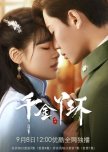
Fifty shades of cliche.
This drama is a dark, melodramatic blast from the past. It is fifty shades of the worst outdated bodice ripper romance cliches imaginable. Dong Tingyao is the sole survivor of her family's massacre. She suspects warlord Fang Tianyi to be the culprit and finds herself a maid in his household. The villain is obvious from the beginning but sadly our voluptuous heroine has more guts than brains and finds herself in one dicey situation after another. Fang Tianyi is the kind of alpha male hero that struts around flaunting his magnificent chest while he uses very coercive methods to seduce Tingyao. Yes, exactly the kind of story that has all but been eviscerated since the advent of feminism and political correctness decades ago. And yes, I unabashedly sucked up every ridiculous, outrageously hot but ahem,I mean totally unacceptable moment of it!The bottom line is you won't enjoy this drama if you think about it. But the leads sizzling chemistry and Fang Tianyi's hot, searing gaze and the heavy lidded way he eyeballs Tingyao is enough to make me forget to breathe, much less think. Despite the cheesy lines and some iffy costumes, the acting, especially by Dai Gaozheng is mesmerising. The melodramatic plot allowed both actors to demonstrate their ability to convey the gamut of intense emotions - love, hate, forbidden desire, fear, frustration and passion, lots and lots of passion. For the first time I really understand why these kinds of characterisations used to be so hugely popular in the past. It is a strong testament to the actors chemistry and skills that can make me look past all these out of favour tropes. Honestly if anyone in real life tries to pull a Fang Tianyi on me, he'd get a kick in the nuts that causes permanent damage. But as a fantasy guilty pleasure of a short drama (10 minute episodes), I enjoyed this immensely.
The ending was terrible but then so were so, so many other parts. Nonetheless I am peeved about it enough to give it a 7.5 instead of an 8.0. Yes I am petty that way. Still, this is a fantastic way to indulge in the occasional smoking hot guilty pleasure.
Final comment: consider stopping at ep 29 for best viewing experience.
Was this review helpful to you?
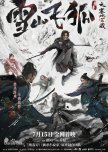
Hiding in plain sight.
A group of eight wicked villains converge on a gorgeous, dangerous snow capped mountain in a race to recover a long lost hidden treasure they have schemed and murdered for. The almost mythical hidden fox is said to guard the treasure. Young disciples Gui Yi and Qing Wen find danger and intrigue around every corner. In addition to this shadowy hidden nemesis, they find themselves pitted against their masters and even each other.I wouldn't call The Hidden Fox an adaptation of Jin Yong's "Fox Volant of the Snowy Mountain" (雪山飞狐). It is more like wickedly good fan fiction inspired by the original wuxia masterpiece. This has resulted in very polarising reactions to this movie. Critics lament the loss of the spirit of chivalry and that the complex conflict between the main opponents is dumbed down just another revenge story. I am a huge fan of the original work that is defined by the sheer perfection in the way the story ends at the absolute peak of emotions and suspense. To me, it is Jin Yong's most brilliant and unforgettable ending. At the same time, the after openly invites invites speculation and innovation. That is what the writer intended. This production takes up that challenge and while it falls short of exceeding the original masterpiece, the storytelling is still very, very good. It is very suspenseful, action packed and thrilling with a few dazzling twists that delivers an innovative and cohesive alternate take on original story. Is it ultimately hollow because it comes at the cost of the spirit of the original? Yes, perhaps. But it is still a very entertaining way to pass a few hours.
The other great thing about this is that it is a Lu Yang production. I am a huge fan of his gripping and stylish visual storytelling that is heavily laced with action oriented fight scenes. Naturally as a web movie, it is not at the same level (or budget) of his famed Brotherhood of Blades series. Nonetheless the well choreographed action sequences don't disappoint and are as gripping, brutal and violent as expected of a true blue martial arts movie. Each of the eight villains' hidden secret martial arts technique lends an extra layer of imminent danger and uncertainty in outcome to each deadly encounter. Yes there is some use of slow motion but such well designed and viscerally satisfying fight scenes are an increasingly rare treat these days.
This movie may enjoy a higher rating if they had changed the Chinese title from Jin Yong's original 雪山飞狐 although that may have risked accusations of plagiarism considering how easily recognizable the setting, characters and main plot points are. Even if you love the original, watch it with an open mind and allow yourself to embark on a thrilling hunt for treasure that is hiding in plain sight. 8/10.
Was this review helpful to you?

All style no substance.
I was really excited to watch this Republican period detective drama. Having enjoyed Hu Yitian and Zhang Yunlong's chemistry in My Roommate is A Detective, I couldn't wait to see them team up again in a similar setting. The adaptation of Agatha Christie's Poirot mysteries seemed like an added bonus. Sad to say, despite the visually sumptuous set and costumes, both the characters and cases are bland, uninspired and the pacing is very draggy.While Situ Yan is the lead detective, he is not meant to be a literal adaptation of Hercule Poirot. Poirot with his known eccentricities including his fastidiousness and obsession with symmetry, is one of the the most distinctive, well dimensioned fictional detectives ever. He has a clear process and methodology that is based on human nature and psychology for solving the case. I would never cast Hu Yitian as Poirot and I am ok with the fact that Situ Yan is not Poirot. What I am not ok with is the colorless, cardboard characterisation of Situ Yan as simply a highly intelligent but rather lethargic lawyer with a strong sense of justice. Hu Yitian does his best with the role but he doesn't have much to work with. This is made worse by Luo Shaochuan, the money guy whose contribution to the crime solving aspects of the partnership is unclear. This character is so indifferently written it is not worthy of an actor of Zhang Yunlong's calibre. The two leads get little screen time together as they go down disparate paths in the investigations. Unlike their previous best loved collaboration, Zhou Mowan is more often Situ Yan's sidekick than Luo Shaochuan is. Thus we don't get to enjoy their banter and their incredible chemistry that builds up and fleshes out both characters as they work through the cases. While both female leads are well written and likeable, they crowd out the bromance.
When it comes to adapting these beloved Poirot classics, I am no die-hard Christie purist. I am receptive to and have seen good adaptations that take a fair amount of liberties with the original works. This can be successfully achieved because changes notwithstanding, the adaptation remains true to the essence of Christie; the psychology of the crime. This is where Checkmate fails to deliver. The supporting cast is very mediocre and lacks screen presence. Bland storytelling and poor pacing with unnecessary romantic digressions disrupts the build up in suspenseful tension into the final reveals. The cases must be evaluated convincingly from the point of view of each character, to assess their psychology as a sense of imminent peril escalates. Who was the victim? Why would someone want them dead? Who would cross that line and actually do the dastardly deed? This drama fails to make me feel invested in the human aspects - the victims and potential suspects; it fails to create a sense of urgency to solve the case or engender that mixture of sorrow, pity and revulsion for the perpetrator that is signature Christie.
The first case is Murder on the Orient Express, a well known case that has been adapted to death. While this version does not stand out, it stays close to the original and is fairly well done. Although Roger Ackroyd is also quite well done considering how difficult it is to adapt an unreliable narrator case into this format, from there, things start to go downhill. These cases are masterpieces; material changes should be weighed carefully and not made with the misguided idea that such impeccable Christie plots have scope for improvement or merely for the sake of delivering a surprise twist. Which is what they did to one of my personal favourites. They went for the plausible alternative solution which simply did not fit the human nature aspects of the case. And thus fails to deliver Christie's magic wow factor, the thrill and the chill and that sense of shock, sorrow and acceptance that it all made sense; that it is the best and only solution. It devolves further as cases are stitched together in a cut and paste fashion that is increasingly incoherent. The final case bears little resemblance to what I think must be the original. While it took no genius to spot the the final antagonists a mile away, their motives are uninteresting and unconvincing and the ending is frankly farcical.
If you are a Christie purist, I would say avoid this drama. You will feel they have desecrated some of the author's best works. If not, this is a watchable if unexceptional adaptation. The production values are quite good and the Republican period setting in Harbin has some novelty appeal even though the drama overall is all style no substance. This is a 7.0 for me but I would have rated it 7.5 if they didn't ruin Five Little Pigs and finish in such an absurd manner.
Was this review helpful to you?
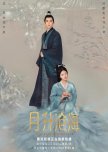
Birds of a feather.
The second part of Love Like the Galaxy 月升沧海 (The Moon Rises over the Ocean) is shades darker as Cheng Shaoshang struggles to open her heart and mind while Ling Buyi's secrets and inner demons are revealed. Their romance plays out in the bosom of the royal family, where Shaoshang blossoms under Empress Xuan's affection and tutelage. This subjects our golden couple to much envy and political intrigue.Shaoshang of Part 1 is disappointingly over empathetic and likeable. Shaoshang of Part 2 is immature and frustrating to the point of being dislikeable, This is exactly how she is meant to be depicted and the portrayal I was waiting for. So I must applaud Zhao Lusi for so daringly rendering Shaoshang as a difficult, often petty, unforgiving, vengeful child woman who wallows most unbecomingly in self pity. As an unloved child, Shaoshang is terrified of love. While she tries to figure out what she wants in a partner, she puts up all kinds of walls and clings to any excuse to not allow Ling Buyi in. She is her own worst enemy, fighting happiness every step of the way. Ling Buyi's infinite patience and indulgence of her is so hot anyone else would have succumbed to raging hormones in short order. Not Shaoshang though. She knows her worth and digs in her heels to demand to be an equal partner in every sense and meaning of that term. While highly usual for a woman of that time, it resonates with modern audiences for obvious reasons.
There aren't really good villains in this drama. That is because Ling Buyi is such a chilling character that he is already as close to a villain as can be. He is a man with a secret, one whose entire raison détre is to uncover the master mind behind the Gu City massacre and to avenge the Huo clan. He did not expect to fall for anyone and certainly not Shaoshang. He meant it when he said they were on different paths. On many occasions he merely eases her way with the intent of letting her go but never quite succeeds. He loves her selflessly and indulges her worst instincts, especially her vengefulness. Hence Yuan Shen's blinding epiphany that Buyi and Shaoshang are birds of a feather. They are rebellious and vengeful eye for an eye kind of people who can't tell the difference between a chicken and a duck. They are also at surface cold, unforgiving even selfish but in truth feel deeply. I find Wu Lei's acting in Part 2 more natural and compelling. He is such a patient, warm and tender person but only for Shaoshang. This is utterly different from the cold-hearted, calculating general who is a borderline psychopathic killer to his enemies. Wu Lei's combat scenes are simply the best. The aesthetic camera angles and gorgeous choreography brilliantly captures his stunning athleticism and graphic, muscular, ferocity that is capable of mowing down an entire battalion.
For me, Empress Xuan is the true hero of this story. As much as I enjoyed Buyi and Shaoshang's journey, it is her story and that of Wen-di and Consort Yue that I find so much more complex and moving. Told with epigrammatic dark humor that dulls the edges of their pain and sacrifice, they are nonetheless imprisoned by values that are bigger than themselves. While Consort Yue lashes out with wit and acerbity, Empress Xuan suffers in dignified silence. Do not be angry with Shaoshang for finding it so difficult to forgive Buyi. Although his cause is just and the outcome serves the greater good, it cost Empress Xuan everything. Shaoshang's first unselfish, grown up act is to accompany her, to atone for what Buyi did and for how she unknowingly helped him. That is what devastates her as much as Buyi reneging on his promise to her. Buyi knows and understands this. Without Empress Xuan's forgiveness and generosity of spirit, they may not have found a way to forgive themselves and each other. Her love is truly like the galaxy in its vastness and selflessness. The galaxy owes it to her to make sure she and Wen-di do not meet again.
In terms of storytelling, very much like Part 1, Part 2 wastes too much time on too many delusional love sick women who conspire against the lovers. This comes at the cost of the storytelling. which towards the end suffers from heavy cuts and sloppy editing. As a result, characters like Lou Ben and Tian Shuo are not properly fleshed out and I did not feel that invested in either the Peng Kun or Guo Village arcs, which feel rushed. When they could have simply omitted both the Fifth Princess and Luo Ji Tong's arcs which were superfluous to the plot. It also underscores how nasty, dumb and divorced from reality the vast majority of the women in this drama are. I really do not like this type of misogynistic and cynical depiction of womenkind. Even though the ending is very satisfying, especially when it comes to the character stories, the unfolding of the plot which we waited way too long for is not well done. Considering the stunning production values, it is a shame if they do not go back and re-edit it with some of the cut footage into a Director's Cut.
All things considered, I enjoyed this beautifully written drama immensely. I find Part 2 slightly better than Part 1 and am pleased to rate the drama in its entirety and Part 2 on a standalone basis a 9.0, better than my 8.5 rating for Part 1 by itself.
Was this review helpful to you?

Genius is 1 percent inspiration and 99 percent perspiration.
At twenty-three, Lin Zhaoxi lives a life of quiet desperation. She grows up in the shadow of two natural math geniuses - her father Lin Zhaosheng and his mentee and love of her life, Pei Zhi. Despite her passion, her aptitude for math is not intuitive and falls short of true genius. Discouraged, she majors in philosophy and is resigned to a mundane existence. She also loses touch with Pei Zhi after he leaves to further his studies in Germany. Her world unravels further when she discovers her father Old Lin has early onset Alzheimer's. Then out of the blue, she is whisked away to cheese world, a parallel world with a childhood classmate Ji Jiang. In order to return to their world or strawberry world, they must win Math Olympics. This was a challenge she failed as a child. It was arguably the great inflection point that put her on a less satisfactory life path, one that is lacking passion.Don't be put off by the math aspects of this drama; the writer does a good job making abstruse concepts and theorems quite approachable and avoids getting bogged down into the weeds. The storytelling indulges in almost ten episodes of sheer childhood delight as the young Lin Zhaoxi, Ji Jiang and Pei Zhi try out for Math Olympics. The child actors led by Wang Shengdi, Fu Bohan and Lin Zeyi blew me away with their natural and uninhibited articulation of joie de vivre that conquers all. The young cast steals the show with their empowering message that genius is 1 percent inspiration and 99 percent perspiration. The Harry Potter allusions were brilliant - it just cracked me up that no one wanted to be Harry! It also pays proper homage to Snape, one of the most complex, fascinating and moving fictional characters ever written. This is indisputably the strongest, best arc of the drama.
The middling arc is a struggle by comparison as both Zhang Xincheng and Zhang Zifeng take time to get in character and are not that convincing as lovers. It is not a bad arc at all, in fact the father daughter dynamics are very enjoyable and touching. It is just that the first arc is just too good. Initially, Zhang Zifeng seems mis-cast because unlike Ji Jiang and Pei Zhi, I could barely see any vestiges of the child that was Lin Zhaoxi. But upon reflection, it is intended that all of that youthful optimism and sense of invincibility is extinguished. The actress really redeems herself in the latter episodes, especially in her chilling encounter with her doppelganger. Oddly it is Zhang Xincheng's performance that doesn't hit all the right notes in this. I think he is much less comfortable taking on grey or flawed roles. I didn't like Pei Zhi for most of the drama and only empathised with him after his heart to heart with his father Pei Donglai in cheese world. Both the young and grown Ji Jiang is far more charismatic and is seamless portrayed by both actors. As always the veteran actors Lei Jiayin, Wang Xiao (Zhang Shuping) and Geng Le (Pei Donglai) are the ones that save the day by extracting the best performances from the younger actors. In this one, even they are outclassed by the amazing kids. Ni Ni's brief stint as an omnipresent and unforgettable character is both delightful and heartbreaking. The drama picks up pace and comes together in the final act. It finishes strongly with a few good mind blowing twists and reveals to end in a good way. Some may not like how it was all wrapped up but I did and I explain why in a spoiler in the comment section of this review.
The Heart of Genius is a well-crafted and intriguing story about life, love and friendship that is comical, inspiring and heartbreaking. Everyone makes mistakes and has regrets; Lin Zhaoxi didn't try hard enough, Pei Zhi lost his father too soon; Lin Zhaosheng didn't fight to clear his name; Zhang Shuping did the wrong thing... This drama tantalises with the impossible fantasy of re-writing history, to have a chance at a do-over of the big what-if moments in life. It proves that even though assholes are still assholes in each world, the grass is not necessarily greener in cheese world; that there are always consequences and trade-offs that are of unknown, unknowable value. Thus we must be consoled by the wisdom that life is not a fairy tale and who we are and who we love are the sum total of our shared experiences good and bad. To live in the moment and to accept what we can't change. It is a very engaging and thought provoking drama that does not seem to get the appreciation it deserves. It is one of the most enjoyable dramas I watched recently and am happy to rate this an 8.5 overall.
Was this review helpful to you?


 25
25 118
118 7
7
















